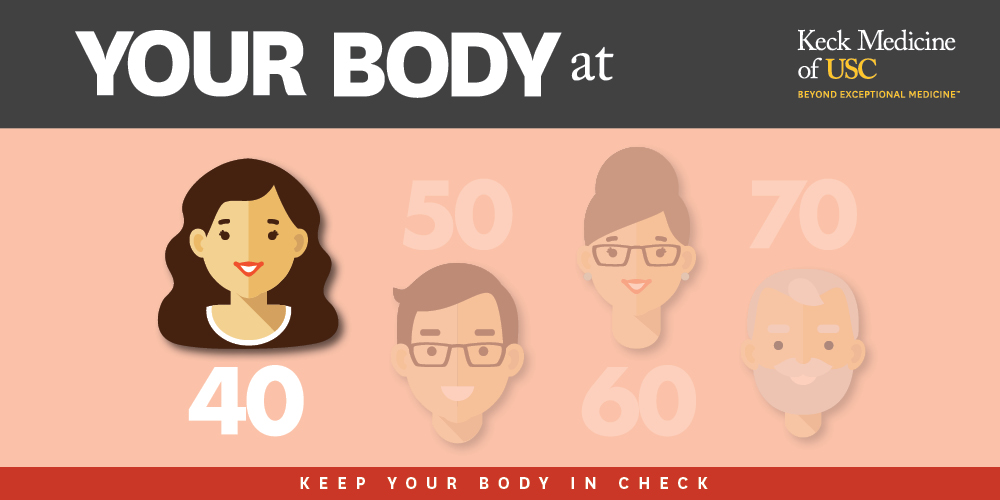
From hot flashes to reading glasses, here’s what you need to know to stay strong and healthy in your 40s.
As you enter your 40s, you may find yourself dealing with some changes in your body. Knowing what’s in store can help you prepare for lifestyle changes to stay healthy and happy for decades to come.
The number on the scale might start creeping up
What to expect: Both men and women will probably notice it’s easier to gain weight as they move past 40. That’s because our resting metabolic rate, or the rate at which our body burns calories, slows. In addition, as we age, we might not be as physically active, and because muscle burns more calories than fat, losing muscle may mean gaining weight.
What can help: Optimizing your calorie intake and incorporating regular physical activity into your life can help prevent weight gain. Maintaining a healthy weight is an important way to reduce your risk for age-related conditions such as heart disease, diabetes and bone and joint problems.
You may see traces of your fun in the sun
What to expect: Although aging in the skin occurs on a continuum, people in their 40s may start to see early thinning, wrinkling and sagging of their skin, along with a thinning of fat on their face, especially in the temples and mid cheeks. They may also see increased pigmentation of the skin that appears as sun spots or faint reddening.
“These changes occur due to a multitude of factors ranging from our genetic makeup and hormone changes to ultraviolet (UV) radiation from the sun, toxins, chemicals and pollutants,” says Jenny Hu, MD, a dermatologist at Keck Medicine of USC and clinical associate professor of dermatology at the Keck School of Medicine of USC. “Your cumulative exposure to the sun’s UV radiation and tobacco use have some of the greatest impacts on skin aging.”
What can help: Reducing additional damage from the sun’s UV rays is crucial.
“Dermatologists recommend using sunscreens that have an SPF of 30 or greater and are ‘broad spectrum,’ meaning they protect your skin from both UVA and UVB rays, both of which contribute to skin aging and skin cancer,” Hu says. “It’s important to apply a liberal amount of sunscreen with a guideline of at least one ounce — enough to fill a shot glass — to exposed parts of the body.”
Be sure to see your dermatologist if you notice moles that have changed color, shape or size, or if you have a lesion that is painful, bleeds or does not heal, as skin cancer risk increases with age.

A new nemesis — hot flashes — may emerge
What to expect: Being in menopause means you haven’t gotten a period for a full year, but it’s a gradual process that starts years earlier, often referred to as perimenopause. Many women in their 40s will enter perimenopause as their body slows its production of estrogen.
In addition to irregular or more frequent periods, loss of estrogen might lead to symptoms like hot flashes, changes in bladder control, sleeping issues, vaginal dryness or irritation and decreased interest in or discomfort during sex.
What can help: Adopting a healthy lifestyle of nutrition, exercise, regular sleep and stress reduction can help you decrease symptoms and adapt to this new phase of life. For some women, hormone therapy or other medications can help relieve, reduce or optimize symptoms — talk to your doctor about whether or not it’s a good choice for you.
Reading the fine print might get even harder
What to expect: Even if you’ve never worn glasses or contacts before, after age 40 you may notice it’s harder to focus close up, like when you’re reading. This condition, called presbyopia, is a normal part of eye aging caused by a hardening of the eye’s lens.
What can help: Presbyopia can be easily remedied in many cases with a pair of reading glasses. Contacts, prescription eyeglasses and surgery are also available. Also be sure you have enough light when reading or doing close work. If you experience any sudden changes in vision, call your doctor right away.
Topics
